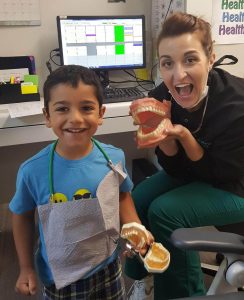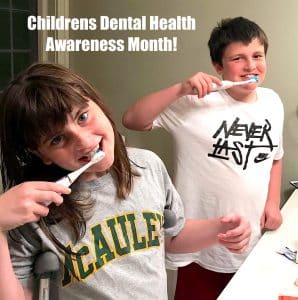Posted by: Maplewood Dental Arts in Uncategorized
February is National Children’s Dental Health Awareness Month

Your Children’s Healthy Diet It all starts with a good diet. Candy and cookies are ok for special occasions, but when eaten regularly they can have a very negative impact on your children’s teeth. Try giving your children fruits like apples and grapes, and vegetables like red peppers and cucumbers instead of candy and cookies. Make a nice plate of sliced peppers, cucumbers, and apples and watch them enjoy snacking on these healthy foods! They will get used to this healthy change, and you can have the comfort of knowing you are not only protecting their teeth, but improving their overall health.
Juice and milk both contain sugar that coats your children’s teeth when they drink. Putting milk or juice to bed with a bottle of milk or juice can cause “bottle rot” in young kids. Milk does have nutrients important for the growth and development of teeth, like calcium, and is a basic liquid so the lack of acidity is good too. We encourage milk at meals instead of juice and water in between meals. Children are more flexible than you might think, and starting these healthy eating and drinking habits early is critical to good oral health, and a lifetime of healthy smiles.

Home Care is Key
Our hygienists will provide you with updated oral hygiene tips to keep your child’s teeth healthy! Teaching kids Helping children develop excellent home care habits, providing a healthy low sugar diet, avoiding sugary drinks, and having positive, regular dental care in our office can go a long way to ensure a lifelong healthy smile for your kids!
At MDA we also consider it very important to monitor your child’s teeth and jaw/growth development and to monitor mouth breathing and teeth grinding which indicates improper jaw development or airway issues. This is something we look for at each visit including monitoring for decay and oral hygiene.
We Recommend Fluoride and Sealant Treatment for Kids
Fluoride is a naturally-occurring mineral that helps strengthen tooth enamel. The application of fluoride treatments to your child’s teeth can help prevent tooth decay and cavities. Depending on your child’s needs, they can receive two to four treatments per year. Children can start receiving fluoride treatments as soon as their first tooth erupts.
Sealants form a thin, clear barrier into and over nooks and crevices of teeth to prevent food debris from getting in and causing decay. We can show you how sealants work at your next appointment and discuss whether they are a good protection option for your child’s teeth.
Cavities Can Hurt
Many children can develop cavities which can cause discomfort and difficulty eating. It is common for children under the age of 5 to have at least one cavity in their baby teeth. At Maplewood Dental Arts, we are committed to providing parents insights and education on how to prevent cavities in their children to keep them healthy and happy. Your child should see us every 6 months for a routine cleaning and checkup. Regular cleanings can help remove the plaque buildup that leads to cavities.
During the checkup, we also take x-rays to scan for any developing issues. If we catch problem areas in their early stages, treatment can help prevent any lasting or severe issues.
CDC Recommendations
Here are more facts and insights we wanted to share with you for National Children’s Dental Health Awareness Month from the Center for Disease Control: Children’s Oral Health.

- About 1 of 5 (20%) children aged 5 to 11 years have at least one untreated decayed tooth.
- Approximately 42% of children ages 2-11 have untreated cavities.
- 1 of 7 (13%) adolescents aged 12 to 19 years have at least one untreated decayed tooth
- Not only can cavities affect a child’s oral health, overall health, and self-esteem, but they can also affect academic performance. The Center for Health and Health Care in Schools reports that 51 million school hours are lost each year due to dental-related issues.
- Wipe gums twice a day with a soft, clean cloth in the morning after the first feeding and right before bed to wipe away bacteria and sugars that can cause cavities.
- When teeth come in, start brushing twice a day with a soft, small bristled toothbrush and plain water.
- Visit the dentist by your baby’s first birthday to spot signs of problems early.
- Talk to your dentist or doctor about putting fluoride varnish on your child’s teeth as soon as the first tooth appears.
- Brush their teeth twice a day with fluoride toothpaste.
- Drink tap water that contains fluoride.
At MDA we also consider it very important to monitor your child’s teeth and jaw/growth development and to monitor mouth breathing and teeth grinding which indicates improper jaw development or airway issues, and this is something we look for at each visit including monitoring for decay and oral hygiene.
Dr. Taliento and the MDA Team




